theartsdesk Q&A: writer and actor Mark Gatiss on 'Bookish' | reviews, news & interviews
theartsdesk Q&A: writer and actor Mark Gatiss on 'Bookish'
theartsdesk Q&A: writer and actor Mark Gatiss on 'Bookish'
The multi-talented performer ponders storytelling, crime and retiring to run a bookshop
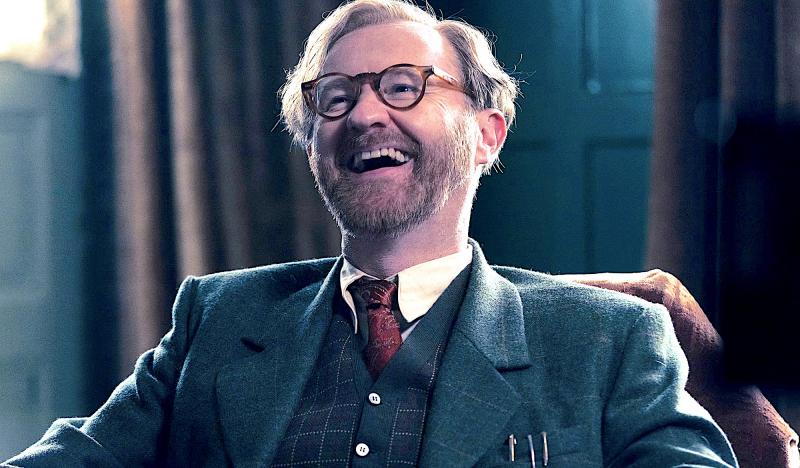
Having played Sherlock Holmes’s politically involved older brother Mycroft in the BBC’s hit crime series Sherlock, Mark Gatiss may not be an obvious candidate to now follow in the footsteps of the famous detective. But with his new murder mystery series Bookish, set in London in the aftermath of World War Two, the creator, writer and star of the six-part show has finally become a sleuth himself.
“The period is very unusual,” he says over Zoom from Rimini, where the historic crime drama had its world premiere at the inaugural edition of the Italian Global Series Festival. “The post-war world is very often ignored, and I thought it would be very interesting to put a lead character into it who is fundamentally optimistic, but also has a secret, which in those days would make him liable to arrest.”
What Gatiss hints at is that his character, the bookshop owner Gabriel Book, is discreetly gay. Yet, this doesn’t hold him back from helping the police to solve the most difficult crimes. Things only get complicated when the past suddenly catches up with the keen detective, presenting Book with a mystery that at first seems unsolvable even to himself (Gatiss as Mycroft Holmes, pictured below).
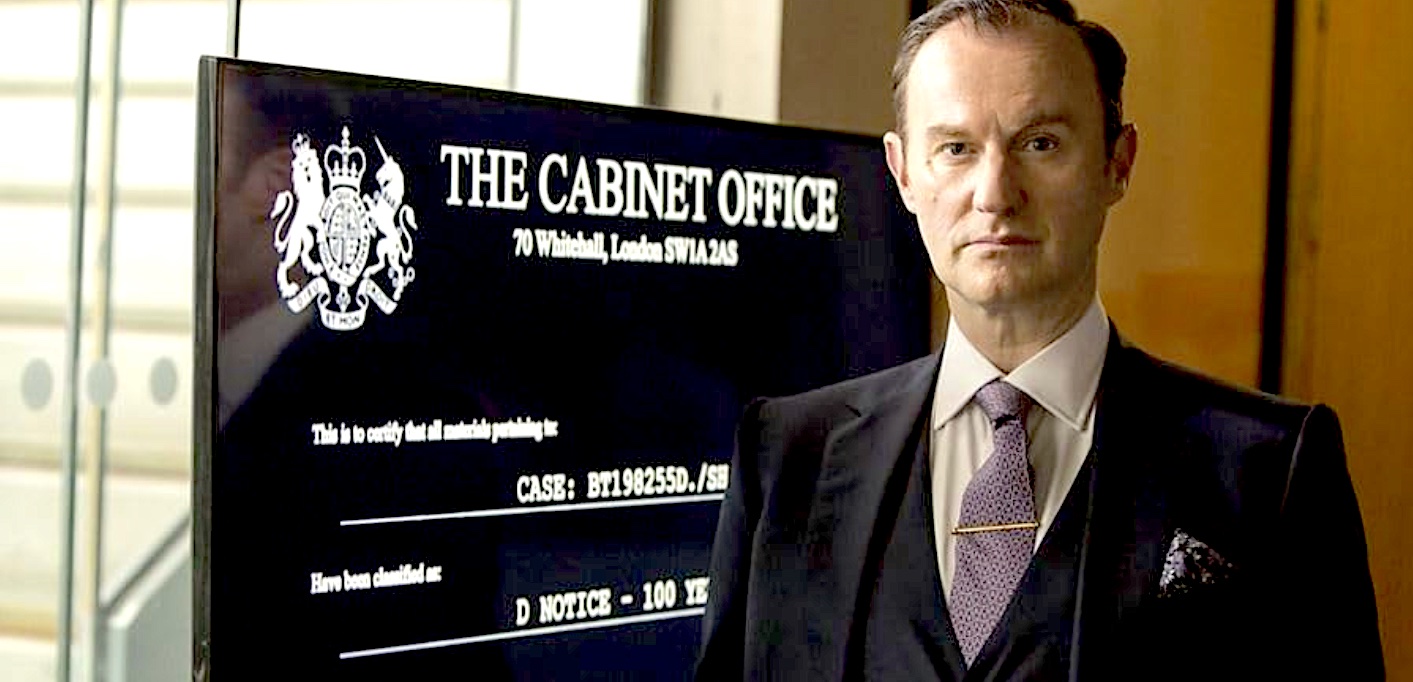 Bookish offers a charming but edgy take on the genre, without any intention of reinventing the wheel. Gatiss knows only too well that it would most likely backfire. “As Sherlock Holmes famously said,” he recalls, “there is nothing new under the sun. All you can really do is draw your influences together and put a fresh coat of paint on it. That’s what I tried to do here.”
Bookish offers a charming but edgy take on the genre, without any intention of reinventing the wheel. Gatiss knows only too well that it would most likely backfire. “As Sherlock Holmes famously said,” he recalls, “there is nothing new under the sun. All you can really do is draw your influences together and put a fresh coat of paint on it. That’s what I tried to do here.”
PAMELA JAHN: Would becoming a bookshop owner or a sleuth have offered an attractive alternative for you in real life if you hadn’t pursued a career in film and theatre?
MARK GATISS: Maybe the former, but not a detective, for sure. My late brother-in-law was a policeman, and I remember when I first met him, I asked. 'are there ever any crimes which are like in books?’ And he said no. So, I think I would have found that world not romantic enough. But I could have run a bookshop. Maybe that’s a nice retirement plan.
What would the shop look like?
Just like Book’s. To me, such places are like heaven. That atmosphere of quiet and quirky surrounded by the smell of books – the older the better. I just love everything about that. And I remember there are two things that influenced my passion for secondhand books. When I was about 14, I bought the complete works of Aubrey Beardsley from a bookseller, who I’m sure was gay. And I just wanted to live in his shop. He had a dog in a basket and a grandfather clock. When he gave me the book, he said, ‘I think you’ll find this very interesting’, and I had the feeling he knew that we had something in common beyond our love for literature.
What was the other incident?
I was in a play when I was about 12 years old. I was playing Charles I, and I wanted to buy an engraving of Oliver Cromwell for the director as a first night present. As I went to Cecil Court just off Charing Cross, there was a print shop, piled high with loose paper and run by a wildly eccentric lady. When I asked her about the engraving, she said, ‘give me five minutes’. Then she disappeared and, shortly after, came back with the picture. She had a mental map of the whole place.
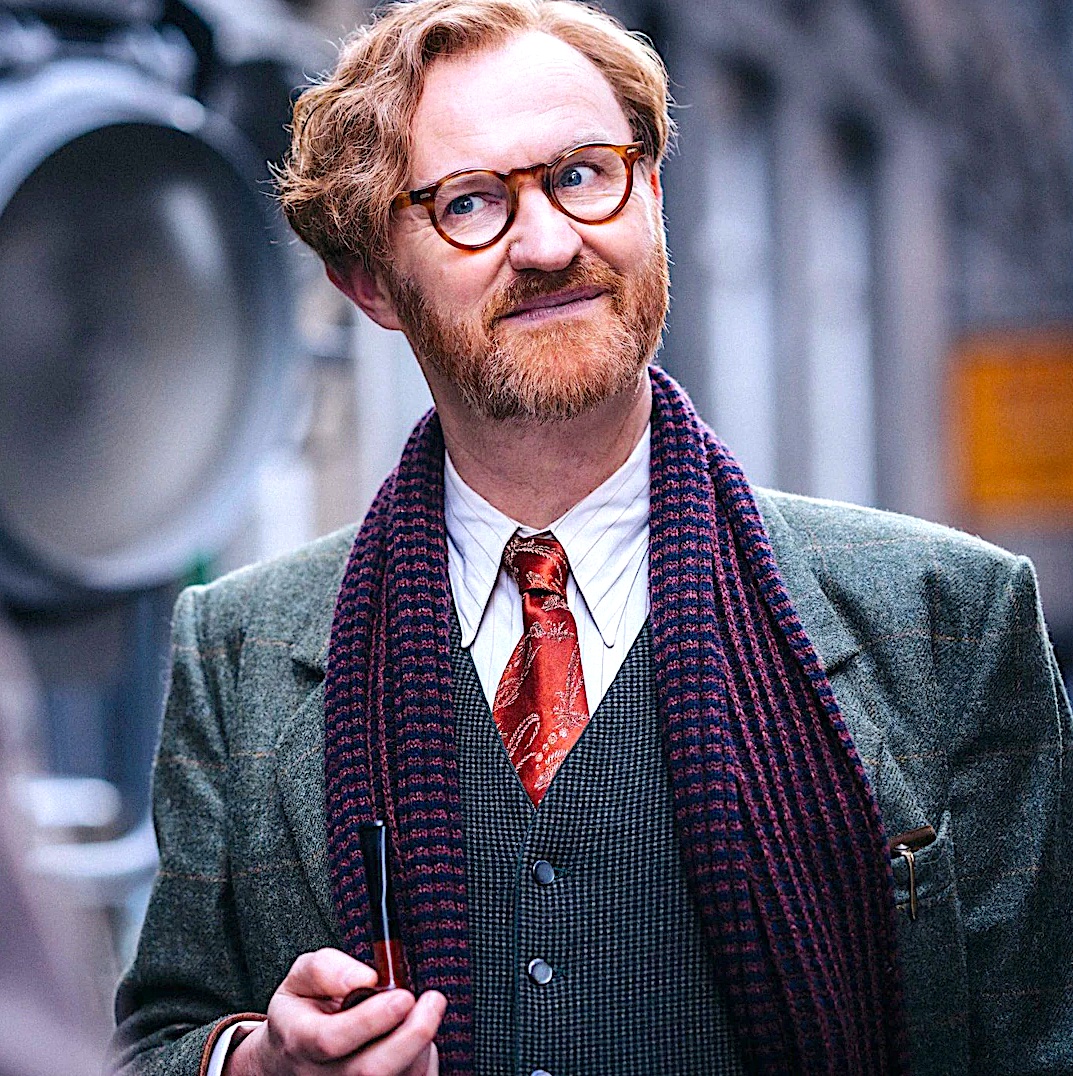 It doesn’t sound like you are much of a Kindle reader…
It doesn’t sound like you are much of a Kindle reader…
No, probably not, but I am. I bought a Kindle a couple of years ago, and it has absolutely transformed my reading habits. I just read many more books because it’s so easy; just the convenience of it, I find semi-miraculous. You finish one novel and another one pops up for 99p. It’s a great invention, and that’s what AI should be. It should be serving us and not replacing our creativity.
Being a novelist yourself, what’s the secret of a good story?
Oh gosh. I don’t know. But Kingsley Amis said, the older he got, the less patience he had with any story that didn’t begin with the words ‘a shot rang out’. And those are the books I like to read. It always depends what you’re after. I know what pushes my buttons, but it’s different for everybody. You can read works of literature which are very beautifully written, but amount to very little. But you can also read a very small story about someone’s personal struggles, which will have your heart in your mouth because you’ve invested in them as a personality. I remember thinking that about The King’s Speech, the film about George VI. I didn’t really care that he was the King. It was the story of a man trying to overcome his stammer that moved me. That, to me, is the story. The rest of it is just trappings.
The crime in Bookish plays out over several episodes rather than just one. Why was that important to you?
I wrote a two-part script because I wanted it to have more room to explore both the main characters and the suspect. There’s a lot to be said for the tighter format, but then they are more like puzzles. And I wanted this to be a combination of things, so that, hopefully, you’re not just staying tuned for the murder mystery. In that sense, the two-parter is a useful way of exploring the different characters, but it’s also difficult because it eats plot, and you’re basically making a film each time, which is what we used to find on Sherlock.
Given your supporting act as Mycroft in Sherlock, it must have been exciting for you now to not only write but also play the detective who’s solving the crimes. Is that your revenge?
Yes, maybe it is. My retaliation on my younger brother. But it also made me appreciate how difficult it is to play the lead because you’re in virtually every scene, and you must explain who’s done it. Those big denouements are part of the game, and I’m not actually a big fan of them.
You said earlier that you wouldn’t make a good detective, but I was wondering if Book’s slightly obsessive nature is something you do have in common with your character?
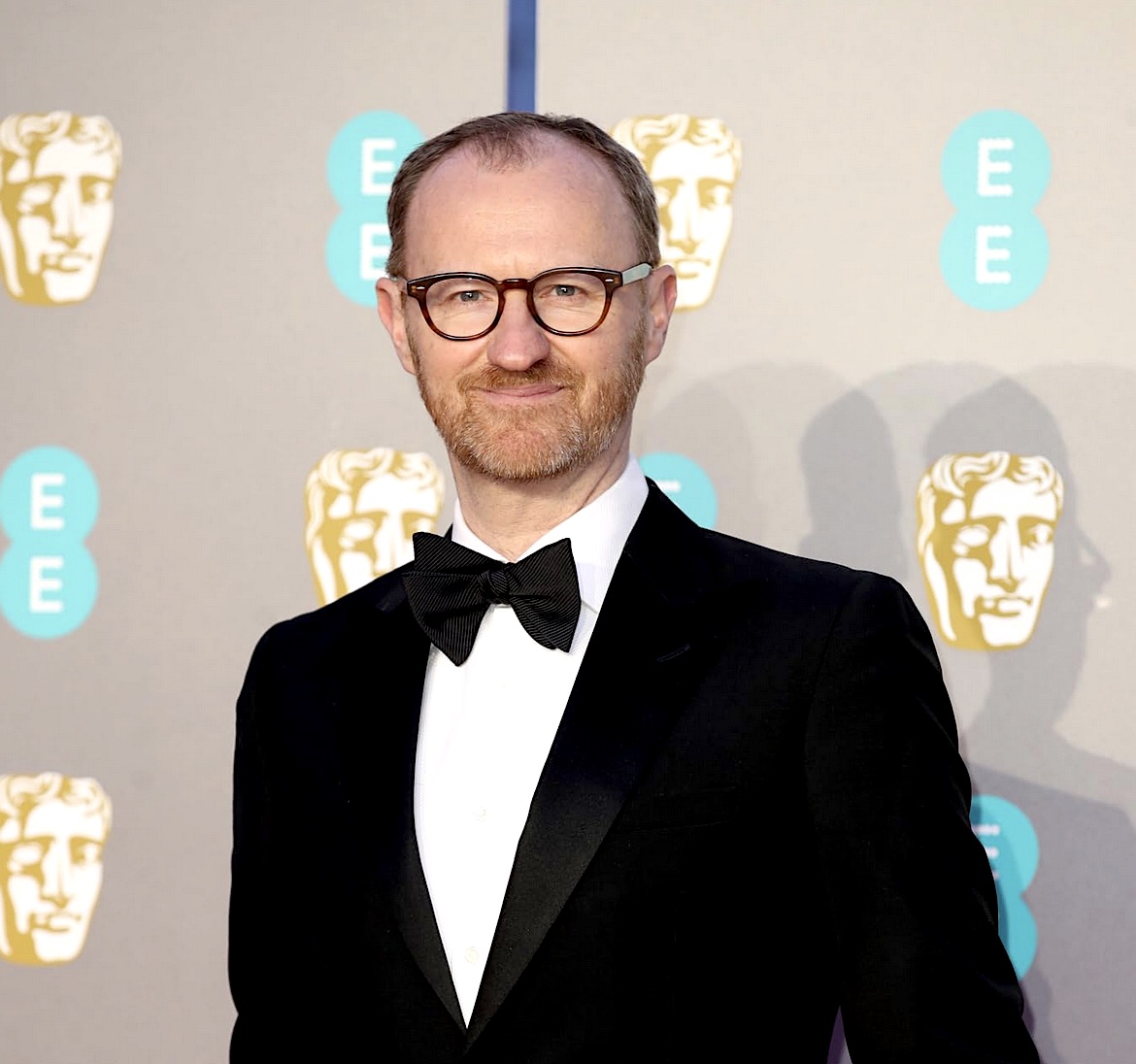 The devil, and the genius, is in the detail, as they say. And I hope this is the kind of show that if people don’t immediately get a reference, they might look it up because that’s what I used to do when I was watching TV as a child. It’s osmosis. It’s a way of communicating a love of books and literature without having to be didactic about it.
The devil, and the genius, is in the detail, as they say. And I hope this is the kind of show that if people don’t immediately get a reference, they might look it up because that’s what I used to do when I was watching TV as a child. It’s osmosis. It’s a way of communicating a love of books and literature without having to be didactic about it.
The look of the series is that of an historical drama, but the music is deliberately modern. What’s behind this choice?
I wanted it to be period, but reflecting a modern sensibility. Because it’s folly to think that people were that much different in the past. The architecture changed and the clothes, too. And some of the rules are different, for example, about being gay. But essentially, people are people, and they have the same problems and preoccupations. Visually, the show looks handsome but, at the same time, it doesn’t shy away from the fact that London was heavily destroyed in the Blitz. I’ve tried to put as many details as possible in about that. There’s one thing that I wish I’d changed though. In episode three, they go to a fancy restaurant with a film star, Book pays for their meal, and then they leave what they haven’t eaten. But of course, back then, they would have absolutely scraped it up and taken it home because there wasn’t enough food.
Can you easily let go of those oversights?
No, you’re actually right about my obsessions. I find those things very difficult to unsee. Sometimes it’s worth fighting for them to be corrected, if you can. Quite often, however, it’s budget related, and those things can be very frustrating. Ultimately, you just have to move on.
You reportedly grew up with horror films. How has that shaped the way you look at the world today?
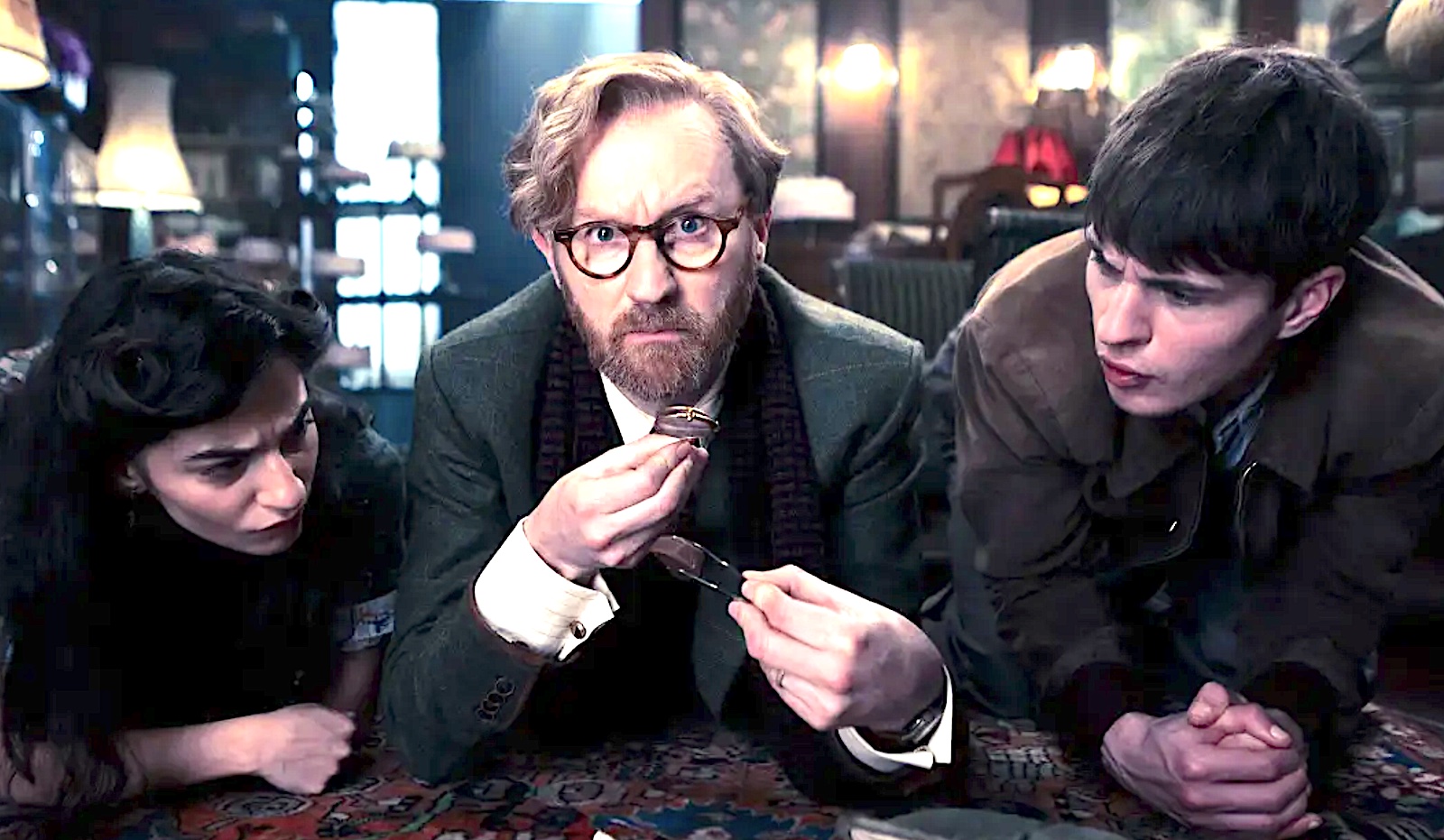 People make a lot out of this, but I’m a fundamentally optimistic person. I’ve always enjoyed horror films, but with a healthy dose of irony. I don’t like things which are brutal and grim in that sense. What attracts me to horror stories is the supernatural element, and I like the escapism about it. I don’t view the world through a glass darkly. I enjoy the thrill of it. Being scared is like a fairground ride for me, not a deep, depressive, morbid instinct (pictured above, Gatiss with Buket Kömür and Connor Finch in Bookish).
People make a lot out of this, but I’m a fundamentally optimistic person. I’ve always enjoyed horror films, but with a healthy dose of irony. I don’t like things which are brutal and grim in that sense. What attracts me to horror stories is the supernatural element, and I like the escapism about it. I don’t view the world through a glass darkly. I enjoy the thrill of it. Being scared is like a fairground ride for me, not a deep, depressive, morbid instinct (pictured above, Gatiss with Buket Kömür and Connor Finch in Bookish).
When did you discover your love for crime stories?
I did grow up on detective dramas as well. I read most of Agatha Christie when I was a young, and I have broad interests across the genre in terms of different detectives and writers.
Has the way that sense of escapism gave you comfort back then changed since your childhood days?
That's a very good question. The current popularity of 'whodunnit' murder mysteries probably speaks to our times in that people are still seeking that sort of escapism, and it's not in stories of nasty multiple serial killers. There's something a bit more traditional about it. For me, it does provide the same comfort blanket. A film like Evil Under the Sun is a perfect Sunday afternoon watch. I probably put it on five times a year, and it never fails to delight me. I guess one of the reasons behind making this show is to say that I try to make things for myself. And I'm always searching for the missing Peter Ustinov as Poirot, essentially.
Bookish feels unashamedly British. Have you come to terms with your Englishness in recent years?
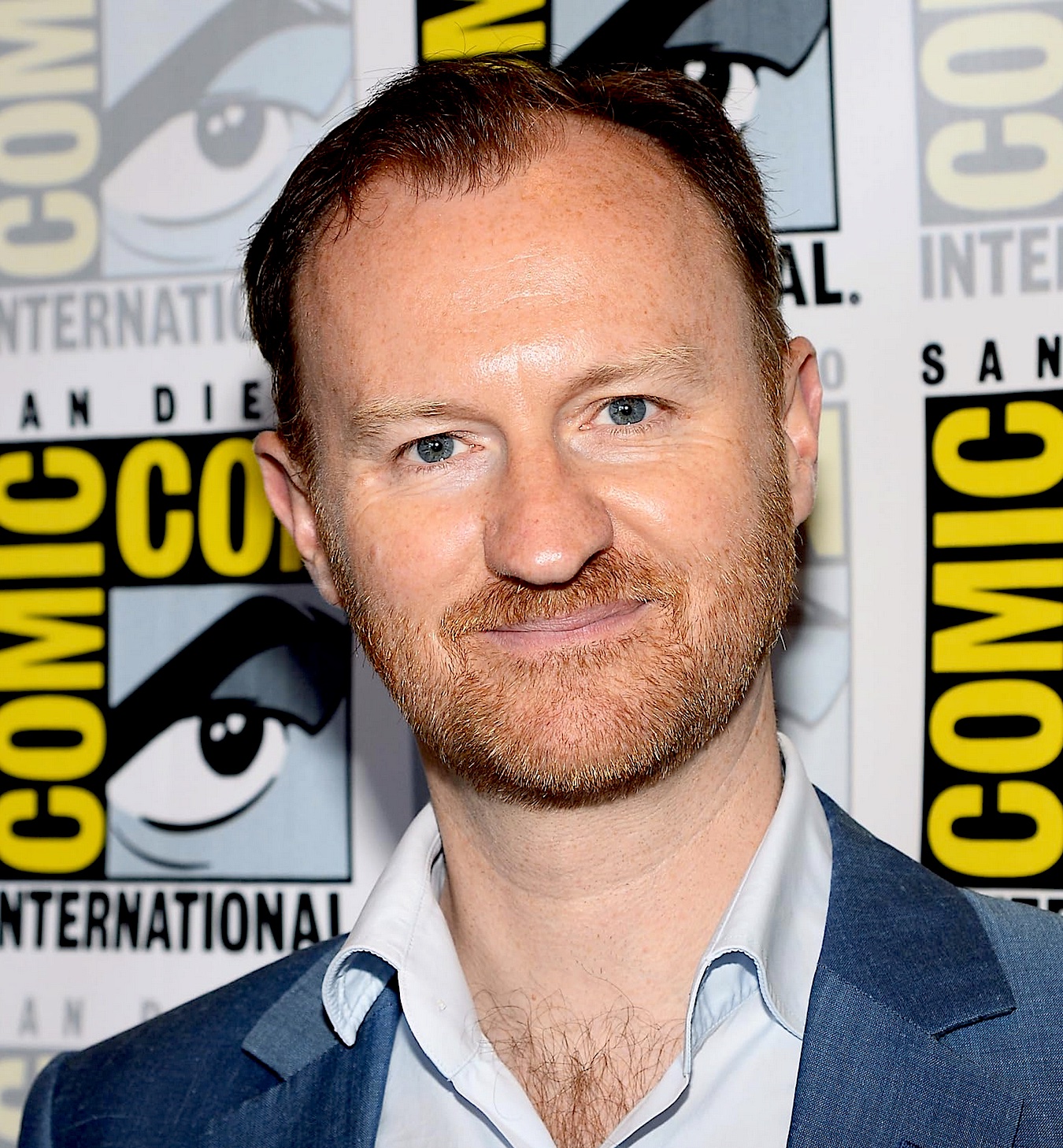 When I said I was ashamed of being English, I was ashamed of where we were as a country. And it's beholden on people to judge, but in this series, I'm trying to say the best of us. It is not fetishizing or weaponising the Second World War in the way it’s being portrayed elsewhere. We have a big problem in Britain. There are people who think that the war was like watching The Great Escape on Christmas Day. They don't want to understand that war is fucking terrible, and they talk about it casually. But the series shows the consequences of it.
When I said I was ashamed of being English, I was ashamed of where we were as a country. And it's beholden on people to judge, but in this series, I'm trying to say the best of us. It is not fetishizing or weaponising the Second World War in the way it’s being portrayed elsewhere. We have a big problem in Britain. There are people who think that the war was like watching The Great Escape on Christmas Day. They don't want to understand that war is fucking terrible, and they talk about it casually. But the series shows the consequences of it.
In what way?
All these people are damaged. All their edges have been frayed by the war. Some of it's been very exciting. Some of it's been very liberating. A lot of it has been absolutely awful. So, I suppose I'm trying, although not in a conscious way, to celebrate the things that are worth celebrating about being English, which is fair play, justice, and having fun rather than all the other aspects which divide us, and which are constantly being brought to the fore.
It was announced that there would be a second season of Bookish even before the first one was broadcast. That's quite unusual.
The decision had to be made because it takes a long time to write, and I had to start working on it before the end of last year. Happily, we got a positive answer from the producers. It is a wonderful vote of confidence.
Explore topics
Share this article
The future of Arts Journalism
You can stop theartsdesk.com closing!
We urgently need financing to survive. Our fundraising drive has thus far raised £49,000 but we need to reach £100,000 or we will be forced to close. Please contribute here: https://gofund.me/c3f6033d
And if you can forward this information to anyone who might assist, we’d be grateful.

Subscribe to theartsdesk.com
Thank you for continuing to read our work on theartsdesk.com. For unlimited access to every article in its entirety, including our archive of more than 15,000 pieces, we're asking for £5 per month or £40 per year. We feel it's a very good deal, and hope you do too.
To take a subscription now simply click here.
And if you're looking for that extra gift for a friend or family member, why not treat them to a theartsdesk.com gift subscription?
more TV
 The Paper, Sky Max review - a spinoff of the US Office worth waiting 20 years for
Perfectly judged recycling of the original's key elements, with a star turn at its heart
The Paper, Sky Max review - a spinoff of the US Office worth waiting 20 years for
Perfectly judged recycling of the original's key elements, with a star turn at its heart
 The Guest, BBC One review - be careful what you wish for
A terrific Eve Myles stars in addictive Welsh mystery
The Guest, BBC One review - be careful what you wish for
A terrific Eve Myles stars in addictive Welsh mystery
 theartsdesk Q&A: Suranne Jones on 'Hostage', power pants and politics
The star and producer talks about taking on the role of Prime Minister, wearing high heels and living in the public eye
theartsdesk Q&A: Suranne Jones on 'Hostage', power pants and politics
The star and producer talks about taking on the role of Prime Minister, wearing high heels and living in the public eye
 King & Conqueror, BBC One review - not many kicks in 1066
Turgid medieval drama leaves viewers in the dark
King & Conqueror, BBC One review - not many kicks in 1066
Turgid medieval drama leaves viewers in the dark
 Hostage, Netflix review - entente not-too-cordiale
Suranne Jones and Julie Delpy cross swords in confused political drama
Hostage, Netflix review - entente not-too-cordiale
Suranne Jones and Julie Delpy cross swords in confused political drama
 In Flight, Channel 4 review - drugs, thugs and Bulgarian gangsters
Katherine Kelly's flight attendant is battling a sea of troubles
In Flight, Channel 4 review - drugs, thugs and Bulgarian gangsters
Katherine Kelly's flight attendant is battling a sea of troubles
 Alien: Earth, Disney+ review - was this interstellar journey really necessary?
Noah Hawley's lavish sci-fi series brings Ridley Scott's monster back home
Alien: Earth, Disney+ review - was this interstellar journey really necessary?
Noah Hawley's lavish sci-fi series brings Ridley Scott's monster back home
 The Count of Monte Cristo, U&Drama review - silly telly for the silly season
Umpteenth incarnation of the Alexandre Dumas novel is no better than it should be
The Count of Monte Cristo, U&Drama review - silly telly for the silly season
Umpteenth incarnation of the Alexandre Dumas novel is no better than it should be
 The Narrow Road to the Deep North, BBC One review - love, death and hell on the Burma railway
Richard Flanagan's prize-winning novel becomes a gruelling TV series
The Narrow Road to the Deep North, BBC One review - love, death and hell on the Burma railway
Richard Flanagan's prize-winning novel becomes a gruelling TV series
 The Waterfront, Netflix review - fish, drugs and rock'n'roll
Kevin Williamson's Carolinas crime saga makes addictive viewing
The Waterfront, Netflix review - fish, drugs and rock'n'roll
Kevin Williamson's Carolinas crime saga makes addictive viewing
 theartsdesk Q&A: writer and actor Mark Gatiss on 'Bookish'
The multi-talented performer ponders storytelling, crime and retiring to run a bookshop
theartsdesk Q&A: writer and actor Mark Gatiss on 'Bookish'
The multi-talented performer ponders storytelling, crime and retiring to run a bookshop
 Ballard, Prime Video review - there's something rotten in the LAPD
Persuasive dramatisation of Michael Connelly's female detective
Ballard, Prime Video review - there's something rotten in the LAPD
Persuasive dramatisation of Michael Connelly's female detective

Add comment